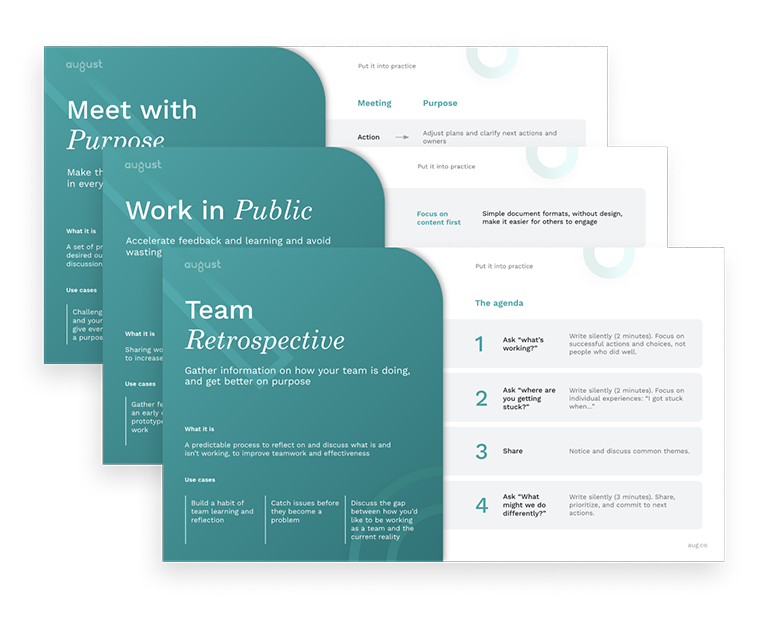Published October 18, 2022 | Updated August 14, 2024 | 4 minute read
In Summer 2022, August embarked on its first experiment with a shortened work week. At the end of September we held a retrospective to discuss what worked, what didn’t, and what we learned. This blog is the second in a 4-part series reflecting on our discoveries.
Heading into Summer Fridays, we knew that sub-par business performance might be a risk.
Given our commitment to “work less,” we had to sacrifice something – and so we accepted that we might see a decrease in new deals added to our sales pipeline. Since summer is often a “slow season,” this seemed like a worthy trade-off for the opportunity to try out a model that has so many proven benefits.
To our surprise and delight, however, every aspect of our business performance either sustained or improved over the course of Summer Fridays – and sales did not suffer at all!
We were able to maintain or improve our business performance while enjoying meaningful benefits in terms of rest and rejuvenation.
Our agreement to “work less” forced us to work smarter and more strategically. This resulted in fewer hours with higher focus. We were more proactive in forecasting problems in advance and getting in front of approaching benchmarks. This seems a likely contributor to our improved business metrics during this time.
Increased Revenue & Sales
During our 12-week experiment, we exceeded our own revenue targets by 22.5%. Our total revenue was our highest ever across a 4-month period, as were our total sales. We even increased our new client sales!
The one metric that dipped over the summer was in our rate of bringing new clients into our sales pipeline. This was only a slight dip, and hasn’t significantly impacted our sales in the month since we concluded the experiment. The long-term impact remains to be seen, but our forecast metrics are looking positive.
Improved Team Experience
While business accelerated, team members reported significant benefits in their employee experience. August pals enjoyed increased productivity, greater flexibility to structure their work week as they saw fit, and more time spent relaxing with family and friends.
There were trade-offs, of course. We all experienced a greater intensity during work hours. Our sense of community and camaraderie took a hit, as we had to meet less often, and prioritize business over connection when we did gather. There was also some struggle to coordinate tightened schedules across time zones.
But overall, the benefits outweighed the costs. We’re already in conversation about how to mitigate those downsides next time.
How We Did It
A 4-day work week is not a panacea. The benefits and drawbacks are mixed, and greatly depend on the company culture and business habits that underpin the shortened schedule.
We have several operational practices already in place at August that were highly conducive to our business success during Summer Fridays.
Clear weekly metrics
We practice radical transparency, which gives each team member a clear picture of how we’re doing in real time. I maintain a shared spreadsheet where I report on sales, revenues and expenditures, and where each team member reports their own sales habits on a weekly basis. By keeping our metrics open to everyone, we center business development as a priority for the whole team.
Trust and Autonomy
Every member of the team is trusted to pursue sales as they see fit, with minimal oversight. Each August pal has the authority to communicate with prospective clients to define their needs, establish a scope of work, seal the deal and deliver the promised value. We support each other as needed, but we don’t have to wait for “alignment” with other team members before we move forward with client relationships.
An Ever-Improving Sales System
Our team has put a lot of energy into refining our sales process. We share what is working and codify best practices on a regular basis. For us, sales are an evolving practice, adaptable to changing times and an ever-changing professional climate. This empowers us to meet new clients at their current stress points, and respond to the unique needs of this particular moment.
With the right setup, a 4-day week can be great for business.
If you’re considering your own version of the 4-day work week, I highly recommend you design a short-term experiment to test it out. Collect data along the way, and conduct a retrospective at the end to discuss what worked and what could be improved.
We didn’t expect to improve our business performance during a shorter week – in fact, we consciously prepared ourselves for a dip.
But by designing an experiment that met both our short-term risk tolerance and long-term learning goals, we discovered a surprising business upside we might never have found otherwise!


.jpg)






